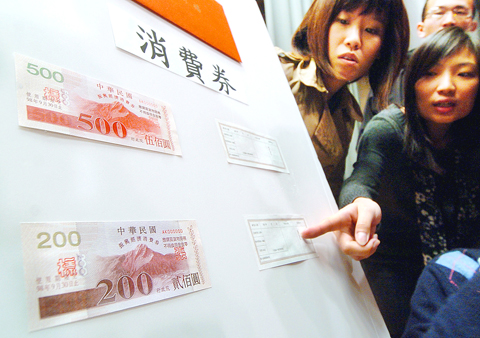The Executive Yuan yesterday displayed counterfeit-proof consumer vouchers that are modeled after paper money so people can tell if they are real just by looking at them or feeling them.
To make counterfeiting the vouchers more difficult, seven kinds of technology were used in the design, Chao Chung-shing (周中興), chief of the Technical Research and Development Office of the Central Engraving and Printing Plant, told a press conference after the weekly Cabinet meeting.
Chao said people can see gold-to-green color shifts when they rotate the paper and feel the embossed texture when they touch the vouchers because of a letterpress design.

PHOTO: FANG PIN-CHAO, TAIPEI TIMES
People will be able tell if a voucher is real by looking for a multi-layer watermark image of a plum blossom and its matched image on the opposite side when light passes through the paper.
Chao said that people can see tiny, hidden tiny characters embedded on the vouchers and different colored fibers when they are held under ultraviolet light.
The consumer vouchers are smaller than paper money, and the design features Yushan, the highest mountain in the country.
Every citizen and foreign spouse qualifying for the voucher will receive six red-colored vouchers with a face value of NT$500 each and three coffee-colored NT$200 vouchers in a “lucky envelope” with “Happy New Year” in Chinese characters on it to symbolize auspiciousness.
The government will distribute the NT$3,600 in consumer vouchers on Jan. 18, one week ahead of the Lunar New Year to boost spending.
Chou said that a voucher would be considered invalid if one-fourth of its area was damaged.

Alain Robert, known as the "French Spider-Man," praised Alex Honnold as exceptionally well-prepared after the US climber completed a free solo ascent of Taipei 101 yesterday. Robert said Honnold's ascent of the 508m-tall skyscraper in just more than one-and-a-half hours without using safety ropes or equipment was a remarkable achievement. "This is my life," he said in an interview conducted in French, adding that he liked the feeling of being "on the edge of danger." The 63-year-old Frenchman climbed Taipei 101 using ropes in December 2004, taking about four hours to reach the top. On a one-to-10 scale of difficulty, Robert said Taipei 101

Nipah virus infection is to be officially listed as a category 5 notifiable infectious disease in Taiwan in March, while clinical treatment guidelines are being formulated, the Centers for Disease Control (CDC) said yesterday. With Nipah infections being reported in other countries and considering its relatively high fatality rate, the centers on Jan. 16 announced that it would be listed as a notifiable infectious disease to bolster the nation’s systematic early warning system and increase public awareness, the CDC said. Bangladesh reported four fatal cases last year in separate districts, with three linked to raw date palm sap consumption, CDC Epidemic Intelligence

US climber Alex Honnold left Taiwan this morning a day after completing a free-solo ascent of Taipei 101, a feat that drew cheers from onlookers and gained widespread international attention. Honnold yesterday scaled the 101-story skyscraper without a rope or safety harness. The climb — the highest urban free-solo ascent ever attempted — took just more than 90 minutes and was streamed live on Netflix. It was covered by major international news outlets including CNN, the New York Times, the Guardian and the Wall Street Journal. As Honnold prepared to leave Taiwan today, he attracted a crowd when he and his wife, Sanni,

Taiwanese and US defense groups are collaborating to introduce deployable, semi-autonomous manufacturing systems for drones and components in a boost to the nation’s supply chain resilience. Taiwan’s G-Tech Optroelectronics Corp subsidiary GTOC and the US’ Aerkomm Inc on Friday announced an agreement with fellow US-based Firestorm Lab to adopt the latter’s xCell, a technology featuring 3D printers fitted in 6.1m container units. The systems enable aerial platforms and parts to be produced in high volumes from dispersed nodes capable of rapid redeployment, to minimize the risk of enemy strikes and to meet field requirements, they said. Firestorm chief technology officer Ian Muceus said